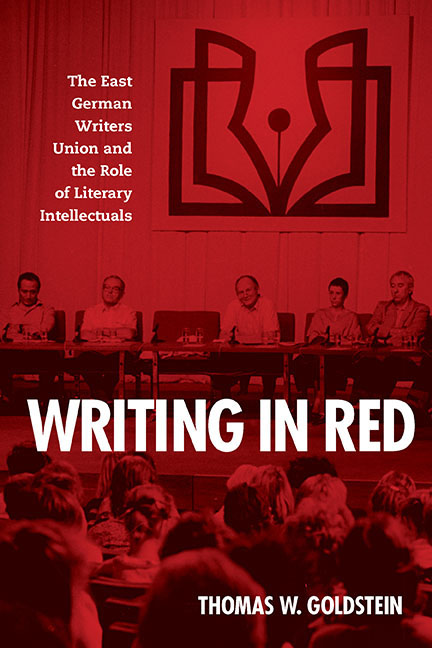Book contents
- Frontmatter
- Contents
- Acknowledgments
- List of Abbreviations
- Introduction
- 1 German Writers Associations through 1970
- 2 Socioeconomic Functions
- 3 The Era of No Taboos? 1971–76
- 4 A Disciplining Instrument, 1976–79
- 5 Defending Peace, Defining Participation, 1979–83
- 6 Years of Resignation, 1983–85
- 7 Glasnost in the GDR? 1985–89
- 8 Coming Full Circle, 1989–90
- Conclusion
- Notes
- Bibliography
- Index
5 - Defending Peace, Defining Participation, 1979–83
Published online by Cambridge University Press: 24 August 2019
- Frontmatter
- Contents
- Acknowledgments
- List of Abbreviations
- Introduction
- 1 German Writers Associations through 1970
- 2 Socioeconomic Functions
- 3 The Era of No Taboos? 1971–76
- 4 A Disciplining Instrument, 1976–79
- 5 Defending Peace, Defining Participation, 1979–83
- 6 Years of Resignation, 1983–85
- 7 Glasnost in the GDR? 1985–89
- 8 Coming Full Circle, 1989–90
- Conclusion
- Notes
- Bibliography
- Index
Summary
IN THE WAKE OF THE HEYM EXPULSIONS, SV leaders were well aware of turmoil in their union. As they prepared for district elections in 1979 and 1980, their plans explicitly addressed the controversy. “The intensified ideological conflicts in recent years within the Writers Union with several members,” an August 1979 report observed, “show clearly that they are part of the great political conflict between socialism and imperialism, and there is no middle ground.” Accordingly, the report instructed that the goal of the elections was a familiar one: to strengthen “the societal function of the association, its impact and responsibility,” including via “the consistent awareness of all interests of association members in accordance with the associational statute and socialist legality.” Post-election evaluations confirmed that such themes had indeed been evident. Yet in addition to such statements, a 1980 report recorded another prominent discussion topic that was not mentioned in any plans: “The securing and defending of peace, the struggle against the realization of the NATO armaments plans, solidarity with the Soviet Union (in connection with the events in Afghanistan).” Given the tense climate, it is unsurprising that these meetings stressed writers’ responsibilities. But the unscripted focus on peace was a new development.
The catalyst was the announcement of NATO's “Double-Track” decision. Reacting to the USSR's installation of intermediate-range nuclear missiles in the mid-1970s, in December 1979 NATO pledged to deploy similar missiles in Western Europe if the Soviet ones were not removed within four years. In response, a heterogeneous global peace movement emerged in the early 1980s, dovetailing with anti-nuclear and disarmament protests from the 1970s. While some activists blamed both sides, many politicians, intellectuals, and ordinary citizens focused on the double-track decision as a reckless act that threatened, by intention or accident, to make Europe a nuclear battleground. As such, much scorn was directed at NATO and the United States for recklessly endangering the lives of millions. Soviet leaders were only too happy to encourage this outlook, and Eastern bloc governments began propaganda campaigns in the early 1980s to do just that, all while suppressing domestic peace activists who criticized the USSR.
The Writers Union played a crucial role in these efforts as authors brought a message of peace to domestic and foreign audiences.
- Type
- Chapter
- Information
- Writing in RedThe East German Writers Union and the Role of Literary Intellectuals, pp. 126 - 151Publisher: Boydell & BrewerPrint publication year: 2017

